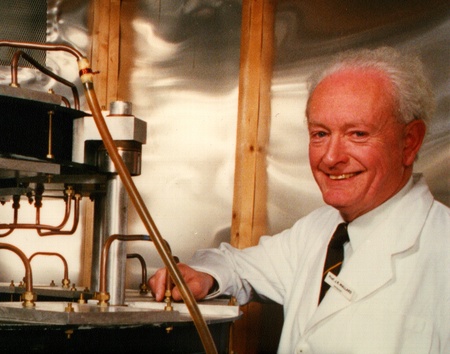The University of Aberdeen is to hold a memorial event to allow friends, family, colleagues and members of the public to pay tribute to MRI pioneer Professor John Mallard.
Professor Mallard, who died in February 2021 aged 94, led the team which built the first whole-body MRI scanner, transforming medical treatment around the world.
The celebration event will provide an opportunity for those touched by his life and work to pay tribute.
Professor Mallard joined the University of Aberdeen in 1965 when he was appointed as the Institution’s first Professor of Medical Physics and became the first holder of the Chair in this subject in Scotland.
Over the next 15 years the team produced the first diagnostically useful, full body MRI images produced using the Mark-1 scanner, which they assembled on a shoe-string budget.
The scanner was first tested on a cancer patient in 1980 revealing cancer sites that were previously undetected and soon captured the first images of multiple sclerosis.
Today MRI machines are a routine part of medical diagnostics all over the world, in specialties from psychiatry and cardiology to orthopaedics and oncology, allowing clinicians to look inside the human body in amazing clarity and detail.
Professor Mallard’s children, John and Katriona, say he would have been deeply touched by the posthumous celebration in his ‘adoptive city’. “We hope as many people as possible will be able to join us either in person or online to pay tribute to his life and achievements, especially as funeral arrangements were very restricted due to Covid lockdowns.
“Our father was born and raised in Northampton and met our Aberdonian mother, Fiona, in London. When an opportunity arose at the University of Aberdeen, they were both delighted to be able to come ‘home’. It meant a lot to our father that he was able to make his MRI breakthrough in the City and he was very proud that Aberdeen holds a place in medical history.”
The couple were thrilled when Aberdeen bestowed the highest honour of the Freedom of the City in 2004. They deeply appreciated the local public support which was shown to their fundraising campaign to bring specialist scientific machinery to Aberdeen.
Professor Mallard donated the many medals and awards he received over his career to the Aberdeen Medico-Chirurgical Society, and these are on display at the Suttie Centre at Foresterhill Hospital. At the time professor Mallard explained, “My wife Fiona and I hope that the medals will serve as a permanent reminder of the terrific stir and excitement which the work here caused at the time, in the scientific and medical world.”
Professor Mallard’s contribution to medical imaging continued long after the development of MRI. He also championed other advances in imaging technology including the development of PET (Positron emission tomography).
His predictions that PET would become one of the most powerful tools for studying human diseases – made in the inaugural lecture he gave shortly after joining Aberdeen - proved correct and today the clinical benefits of PET imaging, used in the management of the treatment of cancer and other conditions, are recognised across the world. The state-of-the-art John Mallard Scottish PET Centre at the Aberdeen Royal Infirmary is named in his honour.
The work of Professor Mallard and his team in changing the course of medical history is also displayed in the exhibition at the Provost Skene’s House which celebrates the contribution of Aberdeen and its heroes in their successes and in changing the world.
University Principal and Vice-Chancellor, Professor George Boyne, said: “We are honoured to host this celebration of Professor Mallard's life with his son John, daughter Katriona and their families.
“Professor Mallard was a pioneer with a vision of what physics could bring to healthcare. The success of that vision can be seen in hospitals and treatments around the world today.
“His legacy is also keenly felt in Aberdeen. The University of Aberdeen continues to push boundaries in medical imaging with the development of the world's first Field Cycling Imaging scanner, which is due to be operational and scanning patients within a new dedicated suite at Aberdeen Royal Infirmary in 2023.”
Emeritus Professor Peter Sharp, who worked for Professor Mallard and then became his successor, said: “I had the privilege of working with John for many years and life was never dull! He was always looking for the next area where physics could be used to improve patient care. Some ideas didn’t work but those that did often had an enormous effect on the delivery of health care.
“The development of MRI by John and his team is rightly recognised as a major achievement. But right at the start of his career in Aberdeen he developed the Nuclear Medicine service at the ARI and then championed the clinical use of Positron Emission Tomography, a technique that gives images of the biochemistry in the body. He was also an enthusiastic educator and his introduction into the university of postgraduate courses in Medical Physics was instrumental in ensuring that medical physics would thrive, not only in the UK but world-wide.”
Registration for the memorial, which will take place at King’s College Chapel on August 19, has now opened at https://www.abdn.ac.uk/events/18890/


